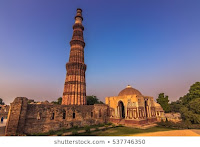After Muhammad Ghori's demise, slave rulers were governed India.
The Slave Kings (Promotion. 1206-1290)
Mamluks were the most punctual leaders of the Delhi Sultanate. They are otherwise called the Slave Rulers on the grounds that a considerable lot of them were either slaves or were the children of slaves and became Kings.
The first of the slave rulers was Qutb-ud-noise Aibak, who was the general of Muhammad Ghori. After the demise of Ghori, Qutb-ud-clamor remained in India and set up his realm.
Qutb-ud-noise Aibak
The leader of Ghazni attempted to add-on the domain held by Qutb-ud-noise, yet he fizzled. When lltutmish succeeded Qutbud-clamor as King, a different realm was set up in the northern India, specifically Delhi Sultanate.
Throughout some stretch of time, the Kings of Delhi stretched out their control up to Bengal in the east and Sind in the west.
During the Sultanate period, there was the issue of the nearby Indian rulers who had been won. Rulers had taken domains of certain rulers and some others were permitted to keep it.
The rulers who were permitted to keep their domains offered an amount of cash as a recognition and consented to assist the King with military help when required.
Sultanate had additionally issues from the north-west, for instance, the leaders of Afghanistan were calm, yet the Mongol individuals of Focal Asia, driven by Chenghiz Khan, made new successes.
The Ruler Iltutmish had confronted the regulatory issues. Nonetheless, when he passed on, his little girl Raziya turned into the king and she needed to confront the issues.
After Iltutmish, the following significant Rulers was Balban, a solid and iron-willed King. He was more fruitful in taking care of the issues than his archetypes. He guarded the Sultanate from the assaults of the Mongols.
Balban battled against the nearby rulers who disturbed him. His most concerning issue was the aristocrats who had gotten amazing and were undermining the situation of the Ruler. Gradually however solidly, Balban broke their capacity lastly the situation of the Ruler turned into exceedingly significant.
Qutb-ud-racket Aibak
Balban's prosperity was coordinated into his vital regulatory approach. He effectively changed the association of the military and controlled the revolt of the aristocrats.
Balban urged individuals to do the 'sijdah' in his quality. Sijdah implies, individuals needed to stoop and contact the ground with their brow in welcome to him (Balban).
Sijdah, appalled the standard Muslims. As per Muslims conviction, "all men are equivalent, and hence, nobody ought to do the sijdah before any other person aside from God."







0 Comments